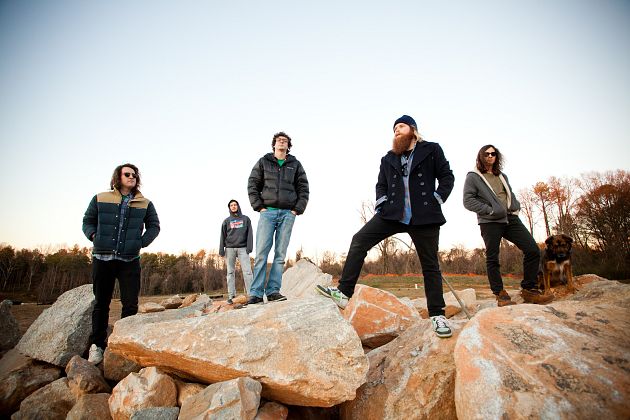
About
Baba Yaga, the second full-length album by Athens, GA’s Futurebirds, marks a milestone in the continuous evolution of the eclectic ensemble. The 13-song album finds Futurebirds – Thomas Johnson, Carter King, Dennis Love, Brannen Miles, Daniel Womack, and Payton Bradford (who has since left the lineup to pursue a non-musical career path) – delivering an expansive yet intimate set that takes the band’s trademark mix of earthily accessible songcraft and free-spirited experimentation into inspired new territory.
Like the band that made it, Baba Yaga defies easy categorization, boasting a beguiling blend of warmly catchy tunes, stirringly evocative lyrics, distinctive sonic textures and unexpected melodic twists. The music is both intense and uplifting, capturing a good deal of the soaring, primal, sweat-soaked spirit of Futurebirds’ live shows, which have already won the group a rabidly devoted fan base and a reputation as a singularly inspired, bravely unpredictable performing unit.
Throughout Baba Yaga, Futurebirds’ inventiveness and energy are suffused by a bittersweet, introspective melancholy that lends added emotional resonance to such compelling tunes as “Virginia Slims,” “Serial Bowls,” “Death Awaits” and “St. Summercamp,” which showcase the band’s indelible melodies, vivid lyrics and vibrant instrumental rapport.
“This album definitely feels like a big milestone for us, no question,” King says. “Just the fact that it’s finally coming out feels like a milestone in itself,” adds Johnson. Indeed, Baba Yaga’s long journey to the public’s ears is a story in itself, but the music more than justifies the album’s long and often frustrating birth cycle.
Early in their existence, Futurebirds’ balance of homespun roots and forward-thinking exploration made the band a favorite in and around their bohemian hometown. The 2009 release of their self-titled debut EP was followed the next year by their first full-length debut album, Hampton’s Lullaby. It was followed by the self-released EP Via Flamina, and the limited-edition 2011 Record Store Day release Live at Seney-Stovall Chapel, which sold out on the day of its release.
Futurebirds continued to build its fan base by touring relentlessly, sharing bills with the likes of Drive-By Truckers, Widespread Panic, Heartless Bastards and Alabama Shakes and performing at such prestigious festivals as Austin City Limits, Outside Lands, Hangout, Wakarusa, Forecastle and Bonnaroo. Futurebirds was also featured on 2011′s Bonnaroo Buzz tour, playing between Gary Clark Jr. and headliner Grace Potter & The Nocturnals.
Futurebirds’ combustible musical chemistry reaches inspired new heights on Baba Yaga. “In some ways we’re like one organism with six brains, but at the same time everyone in the band is vastly different,” King observes. “We had five different songwriters in the band on this record, with very different influences and inspirations. We get into the studio and people bring in their songs, and by the time we get done with a song, there’s a piece of everybody in it.”
“We all come from different backgrounds and chase different sounds, but when we play together there’s this weird dark chemistry amongst us,” Johnson notes, adding, “I can hear a song that someone else wrote and know exactly what I can bring to it, and the same goes for the others when they hear my songs.”
Baba Yaga was recorded in 45 studio days over the course of seven months, with the band touring between sessions in order to pay the recording bills. The musicians originally demoed about 30 songs for the project, 25 of which they recorded during the sessions, before paring that batch down to the 13 that appear on the finished album
“The songs on this album seem to all come from a similar place,” adds Johnson. “They don’t all sound the same or have the same vibe, but we’ve shared so many experiences that there’s an unspoken understanding amongst us as to where a song is coming from and where it wants to go.”
The bumpy road to the album’s release – which resulted in a near two-year gap between Futurebirds releases—included making difficult decisions in finding the proper home for the album, but helped to inspire the band to name it Baba Yaga, after a forest-dwelling, child-eating witch from Slavic folklore.
“It was a long and painstaking process trying to get this album out,” King explains. “We got pretty discouraged, feeling like maybe it would never see the light of day, and one day I was talking to Thomas and started saying, ‘God, is this record some mythical creature out in the woods that only exists in our imaginations?’ Then we read about Baba Yaga, and that perfectly described how we were feeling about this record.”
Fortunately, Futurebirds has emerged from its business travails a more confident and determined creative unit – a fact that the band plans on demonstrating by touring as much as humanly possible.
“The songs can take different lives from night to night,” King says, “because you feed off the energy of the crowd, and that energy can be really different from night to night. The most important thing is to keep things fresh and not be up there going through the motions.”
“Musically, we’re a lot sharper now than we’ve ever been, and that’s a product of playing so many shows,” Johnson concludes. “Going into the recording of the record, we were much better musicians, songwriters and collaborators than we’d ever been, and we feel like the end result reflects our maturity and development.”
With Baba Yaga finally a musical reality rather than an elusive myth, Futurebirds are more than ready to show the world how they’ve grown.
